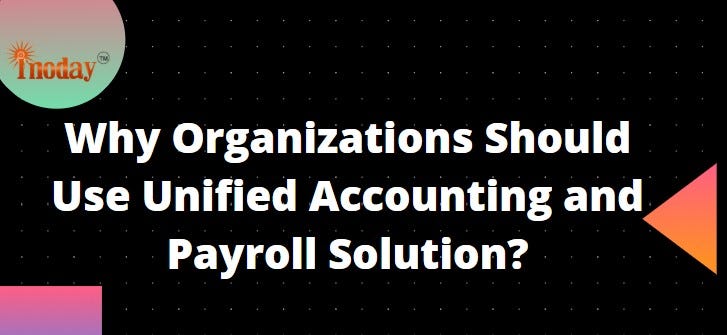Why Organizations Should Use Unified Accounting And Payroll Solution?
Undoubtedly, accounting and payroll are the most fundamental aspects of any business.Payroll &accounting involves company’s recording of its employees’ compensation including:
· gross wages, salaries, bonuses, commissions, and so on that have been earned by its employees
· withholding of payroll taxes such as federal income taxes, Social Security taxes, Medicare taxes, state income taxes (if applicable)
· withholding of the employees’ portion of health insurance premiums, employees’ contributions to savings plans, garnishments of salaries and wages, employees’ contributions to United Way, etc.
· employer’s portion/expense for Social Security taxes, Medicare taxes, state and federal unemployment taxes
· employer’s portion/expense of fringe benefits such as health and dental insurance, paid holiday
Though, payroll and accounting is of utmost importance yet many companies still rely on manual processes and disconnected systems to perform these functions.

Challenges Associated With Separate Payroll And Accounting Solutions
General Ledger (GL) Posting Delays — General ledger postings are delayed in disparate systems as file needs to be received and imported manually to account for payroll costs. The whole process includes five to seven steps with users need to login separately. Any changes that impact the chart of accounts that were not also mapped in your payroll file, such as new GL accounts created for labor costs, could cause import errors and further delay posting. Posting payroll data to the general ledger between the two systems becomes a manual effort each and every time payroll is run.
Manual Reconciliations — When data is stored in separate systems, accounting and payroll professionals need to constantly compare the numbers between the two (or more) systems.Whether it’s reconciling payroll liabilities to GL accounts, bank balances to paychecks or tax payments, or earning types and amounts, it can disrupt period end closing and financial reporting and lead to more compliance and audit risk. In case, finance staff finds variances, they need to troubleshoot in each system and then correct it manually in each system.
Delays In Reporting And Analytics — Delays in reconciliation disrupts the ability to produce accurate and timely financial reports and conduct financial analysis. This eventually delays important workforce decisions such as when to increase the overtime budget or whether a company can offer hazard pay with the current budget. To keep cash flowing, organizations need to make decisions in real time.
Integration Costs — Stand-alone payroll application needs to be integrated with accounting solution. This requires extra implementation time and training. Once implemented, additional time is needed to monitor and troubleshoot the integration between the two systems. If payroll data is needed in other functions, such as project management to assess true project costs, additional integration fees are usually required.
Address These Challenges With Netsuite Suitepeople Payroll
NetSuite SuitePeople Payroll is a payroll solution for paying employees and contractors in the United States. As a part of NetSuite, employees’ time entry, attendance and commission data translates directly to payroll, eliminating the need for manual importing or exporting and reconciliation of payroll data required if using third party payroll providers. This streamlines processes, helping you reduce costs, errors and ensuring payroll is delivered on time.
Key Benefits Of Netsuite Suitepeople Payroll
· Unify and automate payroll with financials for more efficiency and control
· Lower risks and stay compliant with a full-service payroll tax service
· Flexible payment and earnings options with unlimited payroll runs
How Can We Help You?
If you’re looking for reliable NetSuite Implementation Partner, then you should feel free to contact us. We offer professional services like NetSuite licensing, implementation, customization, integration & support. You should feel free to contact us.



Comments
Post a Comment